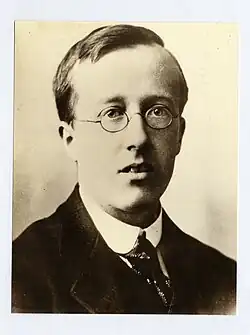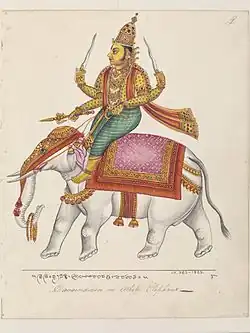Indra (symphonic poem)
| Indra | |
|---|---|
| Symphonic poem | |
| by Gustav Holst | |
 Gustav Holst, c. 1901, in his mid-twenties. | |
| Opus | 13 |
| Composed | 1903 |
| Performed | 25 October 1987 |
| Movements | One |
Indra, Op. 13 is a symphonic poem by the English composer Gustav Holst, which was completed in April 1903.[1] It was one of the first of Holst's works to draw upon his studies of Sanskrit literature.[2] The name refers to Indra, the Hindu god associated with the weather.[1]
Holst's friend and fellow music student, Fritz Hart, recalls the work being 'tried-over' by a student orchestra not long after it was composed.[3] However, its first public performance was not until 25 October 1987 at Chipping Norton School, with the North Oxfordshire Scratch Orchestra conducted by Raymond Head.[4]
Indra's battle
Holst's symphonic poem depicts a battle to the death between Indra and the dragon Vritra. Supporting Indra were his attendant warriors, the Maruts, or stormclouds. Indra was victorious and slew the dragon, which had been withholding the rain from the parched fields.[5]
Indra is the most frequently mentioned deity in the Rig Veda (from ऋच्, "praise"[6] and वेद, "knowledge"), an ancient Indian collection of Vedic Sanskrit hymns (sūktas).[7] Its early layers are among the oldest extant texts in any Indo-European language.[8] It is one of the four sacred canonical Hindu texts (śruti) known as the Vedas.[9]
In a later work, Choral Hymns from the Rig Veda, Op. 24 and Op. 26, Holst would return to this theme with two of the hymns, Indra and Hymn to Indra.[1]
Hindu philosophy
As a young man, Holst became interested in Hindu philosophy, and in 1899 studied Sanskrit literature at University College in London.[10]
Over a period of several years, Holst drew inspiration from the Hindu tradition a number of times, with notable examples being the cantata The Cloud Messenger and the opera Sāvitri.[1] In December 1919, writing in The Musical Times, Edwin Evans, when reviewing the composer's ongoing development, described this as Holst's 'Sanskrit' period.[11] In the 1980s, in Holst and India: 'Maya' to 'Sita', Raymond Head described it as Holst's 'Indian' period.[1]
According to Imogen Holst, her father began exploring Indian culture and history after reading the book Silent Gods and Sun Steeped Lands by R. W. Frazer.[1]

Recordings
| Orchestra | Conductor | Year | Venue | Label |
|---|---|---|---|---|
| London Philharmonic Orchestra | David Atherton | 1993 | Lyrita | |
| Ulster Orchestra | JoAnn Falletta | 2012 | Ulster Hall | Naxos |
| BBC Philharmonic | Andrew Davis | 2018 | BBC Manchester studio | Chandos |
Sources: WorldCat and Apple Classical
References
- ^ a b c d e f Head, Raymond. “Holst and India (I): ‘Maya’ to ‘Sita.’” Tempo, no. 158, 1986, pp. 2–7. JSTOR, http://www.jstor.org/stable/944947. Accessed 21 July 2025.
- ^ Capell, Richard. “Gustav Holst: Notes for a Biography (II).” The Musical Times, vol. 68, no. 1007, 1927, pp. 17–19. JSTOR, https://doi.org/10.2307/913569. Accessed 25 July 2025.
- ^ Hart, Fritz. Early memories of Gustav Holst. The RCM Magazine, Volume 39. pp. 86–87.
- ^ “News Section.” Tempo, no. 163, 1987, pp. 53–55. JSTOR, http://www.jstor.org/stable/945704. Accessed 21 July 2025.
- ^ Ghuman, Nalini (2014). Resonances of the Raj: India in the English Musical Imagination, 1897-1947. Oxford University Press. ISBN 978-0-19-931489-8.
- ^ Derived from the root ṛc "to praise", cf. Dhātupātha 28.19. Monier-Williams translates Rigveda as "a Veda of Praise or Hymn-Veda".
- ^ Gonda, Jan (1989). The Indra Hymns of the Ṛgveda. Brill Archive. p. 3. ISBN 90-04-09139-4.
- ^ Bryant, Edwin F. (2015). The Yoga Sutras of Patañjali: A New Edition, Translation, and Commentary. Farrar, Straus and Giroux. pp. 565–566. ISBN 978-1-4299-9598-6. Archived from the original on 7 September 2023. Retrieved 6 October 2019.
- ^ Witzel, Michael (2005). "Vedas and Upaniṣads". In Gavin Flood (ed.). The Blackwell companion to Hinduism (1st paperback ed.). Oxford: Blackwell Publishing. pp. 68–71. ISBN 1-4051-3251-5.
- ^ Huismann, Mary Christison (2011-04-26). Gustav Holst: A Research and Information Guide. Routledge. ISBN 978-1-135-84527-8.
- ^ Evans, Edwin. “Modern British Composers. VI.-Gustav Holst (Concluded).” The Musical Times, vol. 60, no. 922, 1919, pp. 657–61. JSTOR, https://doi.org/10.2307/3701919. Accessed 30 June 2025.